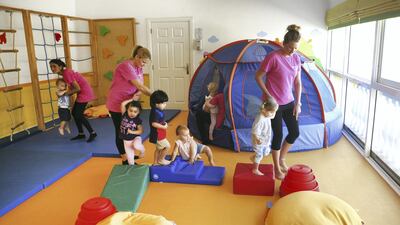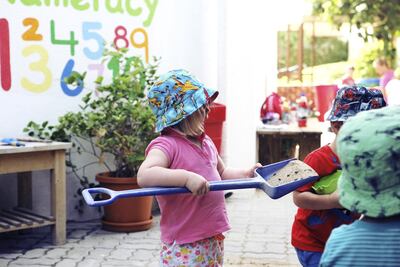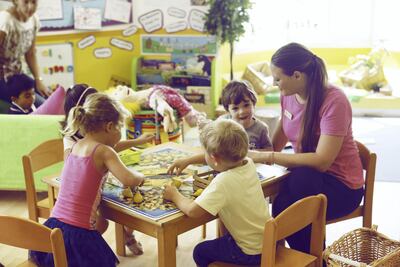Charlotte Borghesi makes a point of reading to her children every evening. As a parent, her concern has been to help them differentiate between words, such as "cat", "car", "bear" and "ball", hoping that they will come to recognise more words with each passing week. However, when the British mum-of-seven took over Children's Oasis Nursery two months ago, one of her teachers revealed a trick that would render the activity even more beneficial.
In the nursery, reading time is not static, given how squirmy little ones can get. Instead, if the group comes across a phrase such as "the red ball", the teacher encourages the kids to bring her another red object from the classroom, which she then identifies as "red fire engine" or "red flower" or "red pillow". Even those who are unable to immediately grasp the task at hand, learn by observing their friends. "And those, to me, are the two biggest advantages of sending your kids to a nursery from an early age – teachers who are highly qualified to make children more resourceful, and being part of a same-age community," Borghesi tells me.
With roots that go back 30 years, Children's Oasis is one of the oldest and most highly regarded nurseries in Dubai. It was the first in the Middle East to receive ISO certification and has one of the highest teacher-to-children ratios in the region. When its former owner decided to retire this year, it was all set to shut down – until Borghesi stepped in. "My younger kids go to school here, and the idea of sending them elsewhere, when I was so comfortable with and trusting of the staff and amenities here, was heartbreaking."
After 20 years in the corporate world, Borghesi decided to take on a new challenge, although the original owner was reticent about selling at first; she would have prefered for the business to close down than for the quality to drop.
When I visit, I walk past a cavalcade of scooters, teeny wheelbarrows, a three-foot-high arched walkway, a mini-majlis, a mud kitchen and wet area "for messy play", and a recycling centre. And that's only the outside.
Within, each of the 11 classrooms resembles a treasure trove of playthings – with ball pits, climbing ropes, cuddly toys, blocks, books, crayons and various other child- and inner-child-friendly accoutrements.
An indoor gym and two common play areas make up the rest of this 5,500-square-foot property.
Given the fees that schools in the UAE levy, I wonder just how necessary it is for the parents of a two-year-old to shell out the Dh15,000-per-term fee that tier-one nurseries such as Children's Oasis charge.
"It's about letting them be their own characters in a group of other children, of giving them a voice from a young age," says headteacher Caitriona Ni Fhiannachta. "It's a huge confidence boost because they learn how to speak out in front of others, so their communication and language skills are enhanced.
"Some parents choose to keep their children at home until the age of five, but a nursery is set up to keep children entertained and stimulated. They learn to share, they learn turn-taking, they learn their Ps and Qs. The overall growth and development instilled in a nursery just cannot compare to that of a child who's kept at home, no matter how hands-on you are as a parent, or how many nannies or siblings the child might have."
____________________
Read more: How to properly support your UAE nanny so she can support you
____________________
Borghesi compares the skills learnt, especially the emotional intelligence (EQ) that develops when you’re part of a community, to the requirements of professional life. As the former general manager at the Mars group, she recalls how companies look for employees and leaders who have a well-developed IQ and EQ, but says that the latter often leaves much to be desired.
"People need to have empathy and listening skills to lead and get the best from a team. But EQ is something that develops from a super-young age. These first five years are called the formative years for a reason. It's not just about the academic, it's also about leadership, confidence, creativity, strategic thinking, the willingness to explore … these skills, once established, are with them for the rest of their lives," she says.
Numerous studies have explored the positive associations between edutainment activities and toys, and brain health, coordination and gross motoring skills among children. Borghesi points out that no matter how many things you buy your kids or how big a space you have, no home can provide the same resources as a nursery. "And children need a lot of stimulation and positive encouragement of their creativity. Schools have the capacity to offer this. And yet, to me, the most important thing a parent should look for when choosing a nursery is the quality of its staff, and the teacher-to-student ratio."
She cites another tool that the Oasis teachers employ, where they create learning opportunities even over lunch. "When my kids are home with the nanny, she puts food on the table, clears up after, sometimes even helps the younger ones to eat it, so they can finish up quickly and she can go about the rest of her chores. But here we encourage the students to fill their own plates, to select what they might want to eat at a particular time and to help clear up afterwards. This teaches them decision-making, curiosity, patience and cleanliness."
Fhiannachta adds: "It is the job of a good teacher to know how to make everything a useful resource. It's like that all-too-common phenomenon, when a young child gets a nice, bulky present for their birthday – the latest toy, maybe – but they end up playing with the box. So it's not about the price tag, it's about how these resources are used: that box can be a treehouse, garage, hospital, umbrella or vet's clinic – even if they are treating dinosaurs. The staff are trained to get the best out of an empty box. And then we have the actual toys, blocks, tea sets, costumes, cars, cuddly bears – all of which are being used in multiple ways. Right from the act of separation, children are taught to be more independent, and distractions come in the form of imagination-building."
The "separation", when parents leave their toddlers in the nursery's care, is particularly difficult for children who are attending school for the first time, as well as those who are returning after a long summer break. Borghesi and Fhiannachta list a number of dos and don'ts to help make the transition easier.
The most important thing, according to them, is for parents to relax, safe in the knowledge that their child is going to have fun, and be loved and cared for in a secure environment.
She says that parents should inform the staff of their chosen nursery in advance of their child's likes and dislikes, so that if your kid enjoys playing with cars or trains or dolls, the teachers will make that available when they are coming in, to distract them.
If you need some extra time to talk to the teachers or ask them questions, make an appointment a few days before, not on the child's first day, when there's likely to be some crying and much confusion.
Remember, the longer you stay, the more upset the child can become. "Children are very clever. If they realise that the more they cry, the longer mum and dad will stay, they hold on to that and remember to use it," says Fhiannachta. Equally important, though, is that you don't make a sudden exit without saying goodbye. "This is a way to reassure them that you'll come back for them," she adds.
And finally, understand that every child is an individual; some might love the first day, but not the next. It's imperative to be patient, with the child and the teachers.
“As a parent, you want to feel that your child is the same as the others. It can be quite stressful if the rest of the kids are smiling, but yours is crying. This is completely normal. Each child has their own way, and they will adjust more easily if the parent is more relaxed. They sense our stress and worries,” says Borghesi.
In a similar vein, keep three don'ts in mind, too: don't give up after the first day or even the first week – children need time to settle; don't deliberately cut down the number of attendance days – this will only serve to increase the separation anxiety each time; and don't feel guilty about sending your child to a nursery.
"Not only are they going to have a whole lot of fun, they are also going to learn important life skills alongside," says Fhiannachta.
____________________
Read more:
New competition to revive Emirati stories
Advice for UAE mums who want to re-enter the workplace
Sharing a lifelong love of reading with your child
____________________








